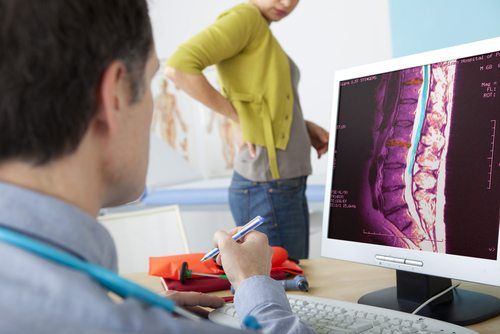Do I have a spinal compression?

Spinal cord compression is, as the name implies, a compression of your spinal cord resulting from any condition that puts pressure on it. The spinal cord itself is a collection of nerves that move information between your brain and the rest of your muscles and organs. As it continues down your back, it is protected and supported by your vertebrae, discs, and the ligaments and muscles that hold it all together and help you maintain an upright stance. All along your spinal column, the nerves extend through openings to communicate with the rest of your muscles and organs.
Where Can Spinal Compression Occur?
There is no limitation to where compression can occur along your spine, ranging from your neck all the way down to your lower back. There are some symptoms that can serve as indicators that you are suffering from spinal compression, including pain, weakness, and numbness in the limbs. These symptoms can occur rapidly, or set in over time, and treatment can involve anything ranging from simple physical therapy and supportive care to surgery.
If you’re experiencing any of the following symptoms, you may be suffering from spinal compression:
- Stiffness in the back and neck can occur independently or with associated pain.
- A burning that manifests in the buttocks, arms, or presents as sciatica, spreading down the legs.
- Cramping, weakness, or numbness in the arms, hands, or legs.
- Losing sensation in your extremities, especially the feet.
- Loss of coordination, especially in the hands.
- Weakness in the feet that causes a limp, known as “Foot Drop”
- Reduced sexual function.
Additionally, if the compression is occurring in the lower back, additional symptoms may occur indicative of cauda equina syndrome. These symptoms indicate an immediate need to get to the emergency room.:
- Reduced or absent control of the bowels and bladder.
- A steadily increasing numbness between the legs, back of the legs, or thighs.
- Pain or weakness of sufficient severity to impair walking or moving from a chair.
How Do I Manage Spinal Compression?
Managing spinal compression is an important part of ensuring the condition doesn’t worsen, and that you’re able to continue enjoying your life before and after treatment. Once you’ve discovered you have spinal compression your doctor will work with you to aid in proper treatment and preparation in the event they decide on performing surgery for your condition.
To help manage your condition you’ll want to work at maintaining a healthy weight and activity level, while also learning how to properly use your body. Body mechanics can aid not just in preventing the worsening of your condition, but can actually serve as a way to increase the strength and resilience of your body and aid in easing your spinal compression.
When Should I Contact My Physician?
You should contact your physician at the first sign that you may be experiencing spinal compression. It is a completely treatable condition in its early stages before much damage has been done, with treatment becoming more difficult as your condition progresses. If you think you are experiencing signs of spinal compression, contact your physician today.


Recent Comments